Methodology
Introduction
This document provides an overview of the typical Ex Libris Rapido implementation process and related tasks to help your institution prepare for an Ex Libris Rapido implementation project.
Ex Libris Implementation Strategy
The Rapido Implementation strategy is specifically designed for institutions to work with Alma for resource sharing. For Live Alma institutions, the Rapido implementation methodology avoids any disruption of ongoing Alma workflows while setting up and testing Rapido. The process also enables library staff and patrons to continue their daily workflows, including discovery, fulfillment, user management, resource management, and acquisitions.
For institutions already working with Rapid ILL integrated with their Alma Resource Sharing, Rapido provides expanded options, flows, and interfaces, and enables ongoing Rapid ILL functionality to continue without any adverse impact.
The Ex Libris implementation strategy leverages the extensive implementation experience and technical knowledge of our staff, enabling you to bring Ex Libris solutions into production mode efficiently and effectively.
Ex Libris experts assist with any issues you may encounter during the implementation process. To perform the initial technical work for your library, Ex Libris staff members apply the knowledge they have gained, and best practices they have developed, from hundreds of previous, successful projects.
- Ex Libris assigns a project manager along with resource sharing expertise to guide you through the entire implementation process to its successful completion.
- Ex Libris performs configuration, and other implementation tasks, based on your input.
- Ex Libris provides Web-based training throughout the project and ongoing weekly calls, as required. For a detailed list of Rapido training offered by Ex Libris, see the Ex Libris Rapido Essentials recorded training sessions.
Implementation Paths
There are several paths for implementation and configuration scope, depending on the resource sharing functionality that your institution is currently using.
- Institutions currently using Alma and already working with Alma Resource Sharing require configuration of the following additional components:
- Rapid ILL configuration
- Rapido configuration
- Institutions currently using Alma and already working with both Alma Resource Sharing and Rapid ILL require configuration of the following additional components:
- Minor Rapid ILL configuration adjustments
- Rapido configuration
- Institutions currently using Alma who do not work with Alma Resource Sharing but do work with Rapid ILL, require configuration of the following additional components:
- Alma Resource Sharing configuration
- Minor Rapid ILL configuration adjustments
- Rapido configuration
- Institutions that are not yet using Alma and are not yet working with Rapid ILL typically perform their Rapido implementation along with their Alma and Rapid ILL implementations, and require configuration of the following components concurrently with Alma:
- Alma Resource Sharing configuration
- Rapid ILL configuration
- Rapido configuration
Implementation Methodology
The implementation methodology is a framework of phases, tasks, and milestone dates based on best practices and years of Ex Libris Professional Services experience. The methodology enables management of mutual expectations and responsibilities that are critical to the success of the Rapido implementation.
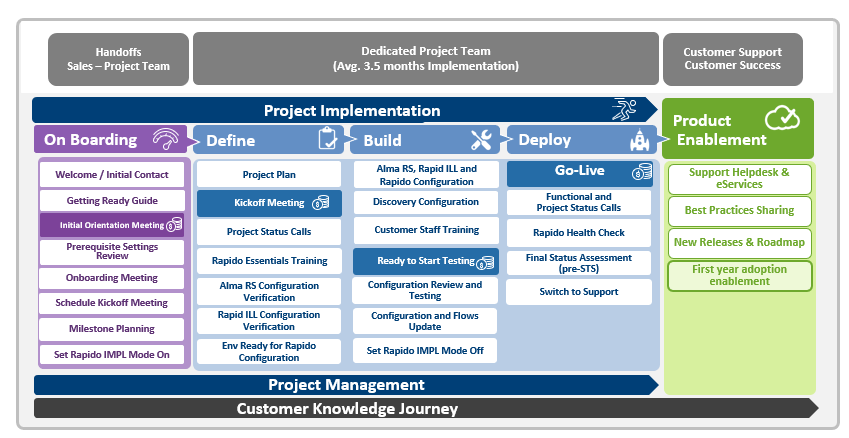
A detailed Rapido implementation plan indicating the major milestones serves as a commitment for your institution and Ex Libris to allocate all relevant resources, complete assigned tasks, and meet agreed upon deadlines.
Rapido Implementation – A Phased Approach
Ex Libris Professional Services follow an implementation approach that pairs an Ex Libris project team with your institution’s project team. The four key phases of implementation are:
- Onboarding
- Define
- Build
- Deploy
The key to success is commitment, cooperation, and collaboration between the team members regarding sharing information, solutions, and challenges.
Project status meetings take place throughout all phases of the implementation to help ensure progress and accuracy and will be coordinated by the Ex Libris project manager.
Typically, a few weeks before implementation starts, the Ex Libris project manager contacts your institution’s project leader to schedule the next step (for example, agreeing on a kickoff meeting date), which leads to the first phase of the project.
Phase 1: Onboarding: Preparing for Implementation
Shortly after signing a contract with Ex Libris, you will receive a welcome kit from the Ex Libris Professional Services Team that includes a series of guides, recorded sessions, and getting started documents to help library staff prepare for Rapido implementation.
During Onboarding, you (with assistance from Ex Libris Professional Services) should:
- Identify project stakeholders and define your project team (organizational planning).
- Review your existing workflows and data. Recommendations for specific areas of review are contained in a separate document – Rapido Implementation Form, which will be sent to the customer project team by the Ex Libris project manager.
- Become familiar with Rapido (initial training and hands-on experience).
- Review the prerequisites for Rapido implementation, including the required configuration necessary for Alma. A detailed explanation of the settings that should be reviewed can be found in the Prerequisites for Rapido Implementation.
- Set up Rapido in implementation mode on your Alma production environment. This step is performed by the Ex Libris project team.
Phase 2: Define
The Define phase begins with the project kickoff meeting. At the kickoff meeting, the Ex Libris team will review all project stages, roles, and responsibilities as defined in the project plan with your team.
During the Define phase, Ex Libris requires your project team to proceed with the Rapido essentials training, which includes a series of recorded sessions. These training sessions provide your project team and staff with an introduction to Rapido concepts as well as the background for understanding the main Rapido workflows.
The Define phase continues with defining the Rapid ILL integration settings.
The scope or configuration that should be reviewed during this stage depends on the implementation path specified in Implementation path section of this document.
All parties participating in the resource sharing flow will be asked to review the Rapid ILL settings and workflow, as guided by the Ex Libris project team. Configuration adjustments may be recommended depending on your current Rapid ILL setup and needs.
If your institution is not yet working with Rapid ILL, you will be asked to review the Alma holding harvest for Rapid ILL document to prepare for this initial setup.
Phase 3: Build
The primary focus of the Build phase is configuration verification and testing.
During this phase, your project team, together with the Ex Libris project team’s guidance and assistance, will work on Rapido, Rapid ILL, and Resource Sharing configuration. The specific scope depends on the implementation path relevant for your institution.
- Institutions that do not currently work with Alma Resource Sharing will need to configure Alma Resource Sharing components
- Institutions that are already working with Alma Resource Sharing will need to make targeted and necessary adjustments to the existing configuration
- Institutions that are already working with Rapid ILL integrated with Alma, do not have to perform any additional configuration (this will be done by Ex Libris) but will need to test existing settings in a Rapido context and make minor adjustments, for example: disabling the Rota assignment for the current RapidILL rule once they are live with Rapido, verifying the link delivery method of setup
- Institutions that are working with Rapid ILL not integrated with Alma will need to configure the Rapid ILL integration with Alma
- Institutions that are not working with Rapid ILL yet will need to configure Rapid ILL and its integration with Alma
- Rapido configuration working with Alma Resource Sharing is required for all institutions and implementation paths.
All guidelines and instructions for required configurations will be supplied by the Ex Libris project team and will be reviewed together with your project team during the project meetings.
During the Build phase, your institution will work on the Rapido / Alma / Primo VE discovery production environment, while Rapido remains in implementation mode (not viewable to end-user patrons) while any live existing Alma, Primo VE, and Rapid ILL functionality is not affected.
In addition, during this phase, your institution will be required to publish Rapido to CDI, to configure labels for Rapido to display in Primo VE discovery to your patrons and to ensure that the CDI search profile is set in a way that you will be able to retrieve expanded resource sharing results that may not be available in your institution.
Once the configuration is completed and verified, testing of the relevant components and workflows should be performed.
Guidelines and timeframes for testing is provided by the Ex Libris project team in coordination with your project team.
The Ex Libris project implementation team works with your project team to verify that Rapido is configured and functions in line with your institution’s workflows.
Your institution is responsible to prepare and deliver internal staff training by the end of the Build phase. Ex Libris recommends that each institution has at least one staff member trained as a Rapido administrator.
Ongoing training review and Q&A sessions take place between the Ex Libris project team and your institution’s functional experts.
The Build phase is completed with the final confirmation of configuration when all the workflows are tested and approved by your institution’s project team.
Phase 4: Deploy
Day 1 of the Deploy phase is your institution’s Go-Live date on the production environment when implementation mode is turned off.
Upon go-live, patrons can view Rapido in their discovery interface and the library staff can begin working with Rapido task lists. Alma lending, borrowing, and sending borrowing rules will no longer be displayed and available for staff.
Throughout the Deploy phase, the Ex Libris project team is available to address any issues and support your staff through their first steps with Rapido in production. During this period, office hours and Q&A sessions are available with your Ex Libris project team.
Upon conclusion of the Deploy phase, your institution is formally transitioned to the Ex Libris Customer Support team for ongoing support. The implementation project is considered complete upon the conclusion of the Deploy phase.
Life in Production: After the Implementation Project
Once live with Rapido, you can perform configuration fine-tuning as required by your institution and can extend the use of Rapido capabilities and keep up with new functionality introduced in monthly releases.
Learn about enabling new Rapido capabilities at your institution by checking out our eLearning catalog and Online Help on the Customer Knowledge Center.
Your relationship with Ex Libris does not end with the Go-Live of Rapido. Rather, Ex Libris is committed to ensuring that your institution’s needs continue to be met.
Our dedicated Ex Libris support team is available to assist you with any product-related issues that you cannot resolve on your own. This includes robust self-service online help tools as well as direct interactive assistance using the CRM for logging and receiving updates on cases submitted. The CRM can be accessed from the Ex Libris Customer portal.
Product Education
Training is provided throughout the entire implementation lifecycle and beyond as an integral part of the success and value realization of the Rapido product. Ex Libris provides training to your institution’s core project team, as noted above, in all three phases of the implementation project. Additionally, on-demand recorded sessions are always available before and after Go-Live via the Ex Libris Knowledge Center, Ex Libris’ online knowledge portal. A significant part of the training can be done at your institution’s own pace.
Training is reinforced with tutorials, comprehensive user guides, and context-sensitive online Help.
Rapido Implementation Project Details
This section provides additional detail regarding typical Rapido implementation timelines and durations.
High-Level Sample Project Plan by Implementation Path
The following diagrams present a high-level time chart of the implementation project flow per implementation path.
Alma RS and Rapid ILL pre-configured
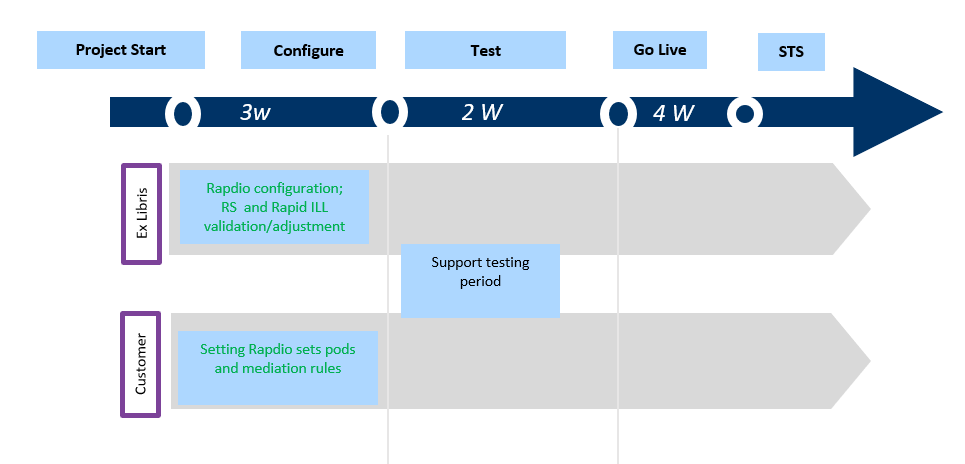
Rapid ILL pre-configured
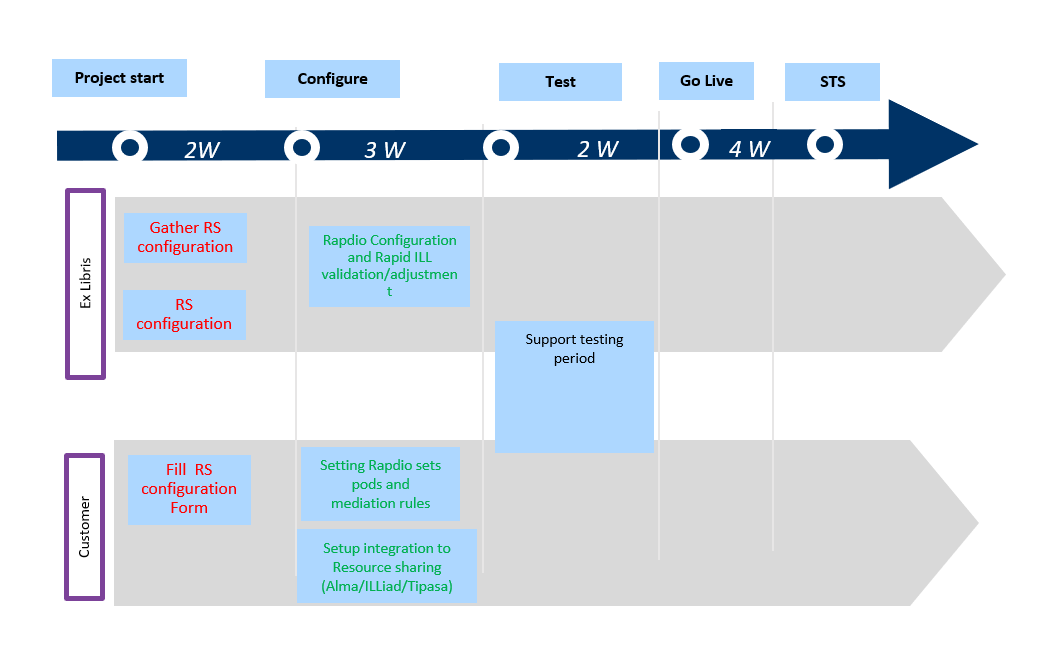
Alma Resource Sharing (RS) pre-configured
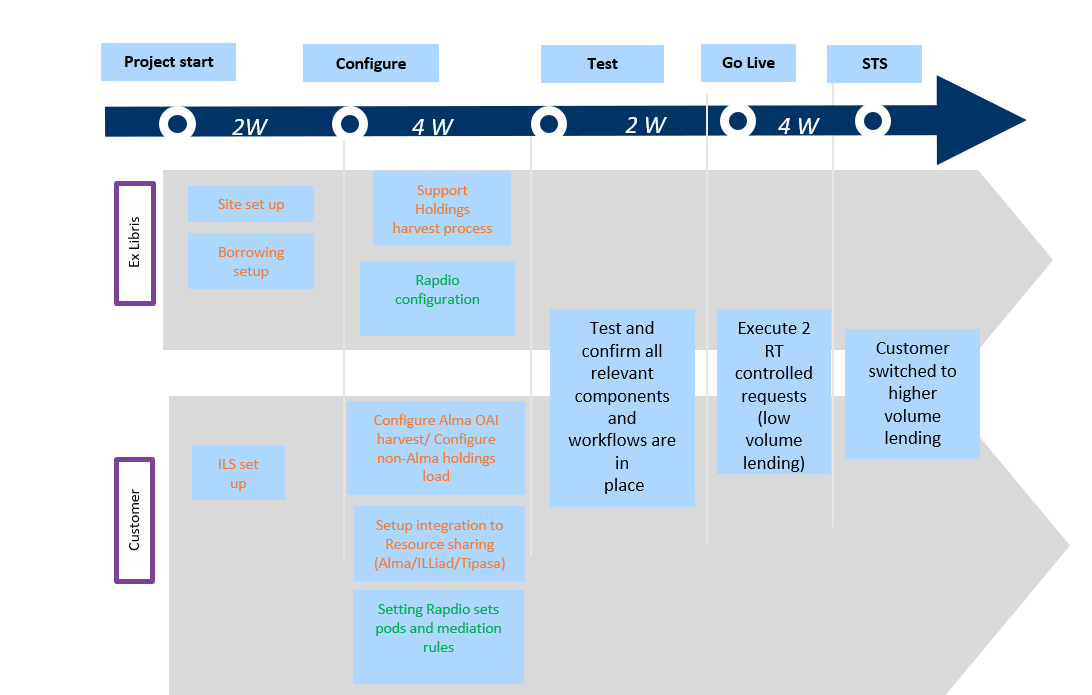
No pre-configured components
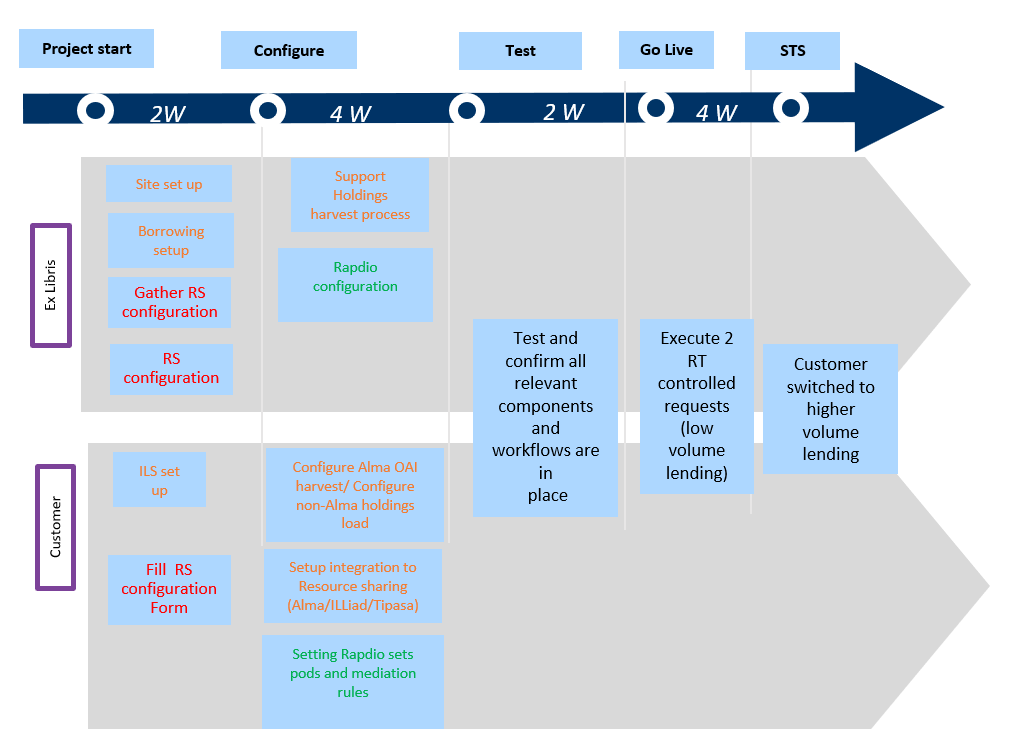
Weekly Activity Table
The following table provides additional details regarding typical project activities to help you plan and prepare for your Rapido implementation project. A detailed project plan, including specific start and completion dates for each step, is presented at the project kickoff meeting.
| Week | Phase | Activity | Owner |
|---|---|---|---|
| Weeks 1-3 | Onboarding | Welcome Initial Contact | Ex Libris |
| Getting Ready Guide Review | Ex Libris | ||
| Introduction Call with Rapido PM | Ex Libris/Institution | ||
| Institution Completes Rapido Implementation Form | Institution | ||
| Alma Prerequisites Settings Review | Ex Libris/Institution | ||
| Onboarding Meeting | Ex Libris/Institution | ||
| Work on Project Milestones Planning | Ex Libris/Institution | ||
| Schedule Kickoff | Ex Libris/Institution | ||
| Set Rapido Implementation Mode | Ex Libris | ||
| Weeks 4-5 | Define | Kickoff Readiness | Ex Libris |
| Implementation Kickoff | Ex Libris | ||
| Training Activities | Ex Libris/Institution | ||
| Verify Alma RS Configuration | Ex Libris/Institution | ||
| Verify Rapid ILL Integration was Added/is Ready | Ex Libris/Institution | ||
| Environment is Ready for Rapido Configuration | Ex Libris | ||
| Weeks 6-10 | Build | Alma RS Configuration | Institution |
| Rapido ILL Configuration | Institution | ||
| Rapido Configuration | Institution | ||
| Institution Configures Primo VE | Institution | ||
| Environment is Ready for Rapido | Ex Libris/Institution | ||
| Configuration Review and Flows Testing | Institution | ||
| Configuration Update | Institution | ||
| Rapido Implementation Mode is Turned Off | Ex Libris | ||
| Weeks 11-14 | Deploy | Go-Live | Ex Libris |
| Post Go-Live Support | Ex Libris | ||
| Switch to Support Readiness Checkpoint | Ex Libris/Institution | ||
| Switch to Support | Ex Libris/Institution |
Ex Libris and Your Institution’s Responsibilities
Based on the project scope and approach outlined above, project resources and responsibilities of each project team are summarized below.
Ex Libris
Roles and Responsibilities:
- Enable your institution to successfully configure and launch Rapido
- Coordinate all activities related to Rapido implementation and perform all activities that are under Ex Libris’ responsibility as detailed in the project plan (for example, configuration, training Q&A, implementation support, documentation, etc.)
| Project Roles | Responsibilities |
|---|---|
| Ex Libris Management |
|
| Ex Libris Implementation Consultancy |
|
Your Institution
Roles and Responsibilities:
- Implement Rapido within the agreed upon timeframe, according to the agreed upon scope of responsibilities noted below
- Manage the institution’s Rapido project team
| Project Roles | Responsibilities |
|---|---|
|
Institution’s Project Leader
|
|
|
Functional Expertise |
|
|
Technology Team Lead and Supporting Resources |
|
|
Administration
|
|
Based on numerous Ex Libris implementations at a wide variety of institutions, we have
identified the following best practices:
Staffing:
- Assemble your team and assign roles at the start of the project so that they can gain as much experience and knowledge from the implementation as possible
- Build internal expertise in Rapido to support increased adoption and consistency across your organization.
- Attend training at the start of the implementation to familiarize yourself with Rapido, and available configuration options. Prior to Go-Live, make sure to refresh your knowledge.
- Practice using your Rapido system knowledge both during and after the implementation to understand how configuration changes and new features can support your business processes.
Execution:
- Ensure influential executive sponsorship and visibility of the initiative
- Ensure involvement of technical (IT) staff in the project
- Prioritize Rapido implementation in the agreed timeline so that other initiatives do not create project delays
- Monitor project progress
- Promote and encourage adoption
- Establish project objectives and assess achievement at the conclusion of the project
Customer Success Program
To help meet your institution’s resource sharing needs and carry out processes as smoothly as possible, Ex Libris has developed the Rapido Customer Success program.
Collaboration begins during the Deploy phase of implementation to coach and guide your institution’s staff throughout the adoption process and extends to post-launch follow-up sessions to ensure success and encourage growth.
The program is designed to help you assess your institution’s needs, define a vision for success, and create an adoption model that enables you to achieve your resource sharing goals.
Depending on local needs, a Customer Success Manager (CSM) may be assigned to actively work with you throughout your journey with Rapido.

